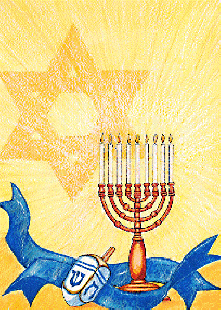|
Christmas is a Christian holy day that marks the birth of Jesus, the
son of God. However it is not only a Christian festival. Christmas has
roots in the Jewish holiday of Hanukkah, the festivals of the ancient
Greeks, the beliefs of the Druids and the folk customs of Europe.
 Each
December, the Jewish community celebrates a festival of lights, called
‘Hanukkah’. Each
December, the Jewish community celebrates a festival of lights, called
‘Hanukkah’.
Over 2,100 years ago, King Antiochus (the Greek ruler of Syria) had
control over the land of Israel, his southern neighbour. Whilst the
Jews believed in one God, the king insisted that they worship many
gods, including himself.
A Jewish rebellion started against the far greater forces of the
occupying armies. After 3 years of war, the Jewish leader - Judah
Maccabee - re-took Jerusalem’s Temple, built by the Jews for the
worship of God. The Temple had been desecrated, abused - by
worshipping pagan gods whose statues had been placed there.
The Jews set about re-dedicating the Temple to God. There were 8 days
of festivities. In the Temple, the oil lamps of the Menorah - a
branched candlestick -were lit again, but there was only enough oil
for them to burn for one day. Miraculously, the oil burnt for 8 days
until new oil was obtained, and so ‘Hanukkah’ has become an 8-day
festival.
Nowadays, as Hanukkah is celebrated, recalling the re-dedication of
the Temple in Jerusalem, Jews re-dedicate them-selves to God. It is a
happy time, and presents are given. Pancakes are eaten, and children
play a game with a spinning top that bears 4 Hebrew letters, standing
for the words: “A great miracle happened here.”
At nightfall on the first day of Hanukkah, one candle is lit. Each
night another branch of the candlestick is lit, until by the end of
the Festival, all 8 are alight.
Let us pray. Basing our words on Jewish prayers used at this time. Of
course we need to remind ourselves that our own bodies are ‘living
temples’ and every bit as important as the old temple was that once
stood in Jerusalem.
|


 Each
December, the Jewish community celebrates a festival of lights, called
‘Hanukkah’.
Each
December, the Jewish community celebrates a festival of lights, called
‘Hanukkah’.